完整word版,外研社小学英语一起小学四年级下语法总结及练习题,推荐文档
(完整word版)外研版小学英语语法总复习知识点归纳

(完整word版)外研版小学英语语法总复习知识点归纳外研版小学英语语法总复知识点归纳一、时态1.一般现在时(1)表示经常发生的动作或事情,通常用“usually通常,often常常,every…每…。
sometimes有时,always总是,”等词。
(2)基本结构:主语I / You / We / They /He / She / It肯定句:主语+动词原形或动词第三人称单数形式否定句:主语+don’t + 动词原形或者doesn’t + 动原一般疑问句(Yes/No) Do…。
Yes。
I do.No,I don’t.Does…(动词原形)…?Yes,he/she does。
No,he/she doesn’t.特殊疑问句What do …。
How does she…(动词原形)…?(3)动词第三人称单数方式(同名词单数酿成复数办法不异)1.普通情形+s如:walk-walks2.辅音字母+y结尾去y +ies fly-flies3.结尾是s。
x,sh。
ch +es watch-watches4.结尾是0 +es do-does。
go-goes5.特殊have-has2.现在进行时(1)表示正在发生的动作,通常用“now现在。
look看,XXX听”.(2)根本方式: be +动词-ingeg: I am(not) XXX.You/We/They are(not) reading。
He/She/It is(not) eating.What are you doing。
Is he reading?(3)动词的目前分词方式(动词+ing)普通情形+ing walk—walking末端是不发音的e-e+ingcome—coming重读闭音节双写末了一个字母+ingswim-swimming。
run-running3.一般过去时(1)表示过去已经发生的事情,通常用“last …上一个…。
just now刚才,many years ago许多年前,XXX昨天”等词。
外研社小学英语一起小学四年级下语法总结及练习题

外研社小学英语一起小学四年级下语法总结及练习题祈使句练题表达说话人对对方的叮嘱、劝告、请求或命令等,往往有表示请求、命令、希望、禁止、劝告等意思。
祈使句一般没有主语,实际上是省略了主语"You"。
句末用感叹号或句号,用降调朗读。
肯定结构都以动词原形开头。
祈使句的肯定句式有三种形式,即:1) Do型(以行为动词原形开头),例如:Sit down坐下!Stand up起立!2) Be型(以be开头),例如:Be quiet!安静!3) Let型(以let开头),例如:Let me help you.祈使句的否定结构是以"Don't+动词原形"开头。
例如:Don't go there。
please。
请别去那儿。
Don't be late。
不要迟到。
用括号内所给动词的适当形式填空。
1.Don't be late.2.Dust the dressing table.3.Don't speak with your mouth full of food.4.Don't talk and read a book.5.Don't drop the nice vase。
Sam.6.Look out。
A car is coming.7.Give us ten years and just see what our country will be like.8.Don't let the baby cry.9.Open the window and shut the door.10.Let'XXX.根据要求改写句子1.Read it again more slowly。
please。
(改为祈使句)2.Don't sit next to Nancy。
(改为否定句)1.There are no us formatting errors in the article。
外研版小学四年级英语下学期知识点总结
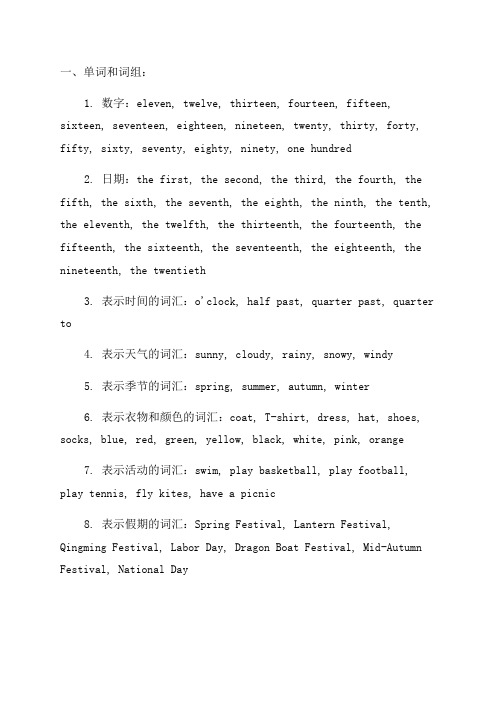
一、单词和词组:1. 数字:eleven, twelve, thirteen, fourteen, fifteen, sixteen, seventeen, eighteen, nineteen, twenty, thirty, forty, fifty, sixty, seventy, eighty, ninety, one hundred2. 日期:the first, the second, the third, the fourth, the fifth, the sixth, the seventh, the eighth, the ninth, the tenth, the eleventh, the twelfth, the thirteenth, the fourteenth, the fifteenth, the sixteenth, the seventeenth, the eighteenth, the nineteenth, the twentieth3. 表示时间的词汇:o'clock, half past, quarter past, quarter to4. 表示天气的词汇:sunny, cloudy, rainy, snowy, windy5. 表示季节的词汇:spring, summer, autumn, winter6. 表示衣物和颜色的词汇:coat, T-shirt, dress, hat, shoes, socks, blue, red, green, yellow, black, white, pink, orange7. 表示活动的词汇:swim, play basketball, play football, play tennis, fly kites, have a picnic8. 表示假期的词汇:Spring Festival, Lantern Festival, Qingming Festival, Labor Day, Dragon Boat Festival, Mid-Autumn Festival, National Day9. 形容词:big, small, tall, short, long, short, thin, fat, heavy, light, strong, weak, fast, slow, happy, sad, angry, hungry, thirsty, excited, scared, tired10. 情态动词:can, can't, could, couldn't, may, may not,will, won't, shall, shall not, must, must not二、基本句型和语法:1. 一般疑问句:Is it...? Are you...? Do you like...? Does he have...?2. 肯定回答:Yes, it is. Yes, I am. Yes, I do. Yes, he does.3. 否定回答:No, it isn't. No, I'm not. No, I don't. No, he doesn't.4.一般现在时的肯定句:主语+动词原形+其他5. 一般现在时的否定句:主语 + 动词原形 + not + 其他6. 一般现在时的一般疑问句:Do/Does + 主语 + 动词原形 + 其他?7. 一般现在时的特殊疑问句:Wh- + do/does + 主语 + 动词原形 + 其他?8. there is/there are 句型:There is + 单数名词 + 其他;There are + 复数名词 + 其他9. can/can't 句型:主语 + can/can't + 动词原形 + 其他10. could/couldn't 句型:主语 + could/couldn't + 动词原形 +其他11. can/could 提示:Can you...? Could you...? Yes, I can. Yes, I could.12. may/may not 句型:主语 + may/may not + 动词原形 + 其他13. will/won't 句型:主语 + will/won't + 动词原形 + 其他14. shall/shall not 句型:主语 + shall/shall not + 动词原形+ 其他15. must/must not 句型:主语 + must/must not + 动词原形 + 其他三、课文内容:1. Unit 1: How Do You Go There?(交通工具的使用方式)2. Unit 2: How Was Your Day Yesterday?(过去一天的活动)3. Unit 3: What's Your Hobby?(运动和爱好)4. Unit 4: What's the Day Today?(日期和天气)5. Unit 5: What Season Do You Like?(季节和天气)6. Unit 6: What Are You Wearing?(衣物和颜色)7. Unit 7: Can You Swim?(运动技能)8. Unit 8: What Did You Do in the Holidays?(假期活动)9. Unit 9: Whose Is It?(物品所有者)10. Unit 10: What Can You Do?(能力和兴趣)四、日常对话和口语表达:1. 问候:Hello! Hi! Good morning! Good afternoon! Good evening! Nice to meet you!2. 自我介绍:My name is... I am... years old. I am from...3. 询问他人的姓名和年龄:What's your name? How old are you?4. 询问他人的住所:Where do you live?5. 询问他人的过去活动:What did you do yesterday? Did you...?6. 询问他人的兴趣爱好:What's your hobby? Do you like...?7. 询问日期和天气:What's the day today? What's the weather like today?8. 询问季节和喜好:What season do you like?9. 询问衣物的颜色和穿着:What color is it? What are you wearing?10. 询问他人的能力:Can you...?以上就是外研版小学四年级英语下学期知识点的总结。
完整word版外研版小学英语语法及习题汇总,文档

小学英语语法及习题16.一、名词复数规那么写出以下各词的复数I_________him_________this___________her______watch_______child_______photo________diary______day________foot________book_______dress________tooth_______sheep______box_______strawberry_____thief_______yo-yo______peach______sandwich______man______woman_______paper_______ juice___________water________milk________rice__________tea__________二、一般现在时一般现在时用法专练:〔一〕、写出以下动词的第三人称单数drink________go_______stay________make________look_________have_______pass_______carry____come________watch______plant_______fly_____ ___study_______brush________do_________teach_______〔二〕、用括号内动词的适当形式填空。
Heoften________(have)dinnerathome.DanielandTommy_______(be)inClassOne.We_______(notwatch)TVonMonday.Nick_______(notgo)tothezooonSunday.______they________(like)theWorldCup?What_______theyoften_______(do)onSaturdays?_______yourparents_______(read)newspaperseveryday?Thegirl_______(teach)usEnglishonSundays.SheandI________(take)awalktogethereveryevening.There________(be)somewaterinthebottle.Mike_______(like)cooking.They_______(have)thesamehobby.Myaunt_______(look)afterherbabycarefully.Youalways_______(do)yourhomeworkwell.15.I_______(be)ill.I ’mstayinginbed.She_______(go)toschoolfromMondaytoFriday.LiuTao_______(do)notlikePE.Thechildoften_______(watch)TVintheevening.SuHaiandSuYang_______(have)eightlessonsthisterm.20. -Whatday_______(be)ittoday?It’sSaturday.〔三〕、按照要求改写句子1.DanielwatchesTVeveryevening.(改为否认句)___________________________________________________2.Idomyhomeworkeveryday.(改为一般疑问句,作否认答复)________________________________________________________Shelikesmilk.(改为一般疑问句,作肯定答复)___________________________4.Amylikesplayingcomputergames.(改为一般疑问句,作否认答复)___________________________________________________5.Wegotoschooleverymorning.(改为否认句)_______________________________________________________6.HespeaksEnglishverywell.( 改为否认句)___________________________________________________7.Iliketakingphotosinthepark.( 对划线局部提问)________________________________________________________8.JohncomesfromCanada.(对划线局部提问)___________________________________________________9.Sheisalwaysagoodstudent.(改为一般疑问句,作否认答复)________________________________________________________10.SimonandDaniellikegoingskating.(改为否认句)___________________________________________________〔四〕、改错(划出错误的地方,将正确的写在横线上)1.Is yourbrotherspeakEnglish? __________________2.Doeshelikesgoingfishing? __________________3.Helikesplaygamesafterclass. __________________4.Mr.WuteachsusEnglish. __________________Shedon’tdoherhomeworkonSundays._________________三、现在进行时〔一〕、写出以下动词的现在分词:play________run__________swim_________make__________go_________like________ write_________ski___________read________have_________sing ________dance_________put_________see________buy_________love____________live_______take_________come________get_________stop_________sit________begin________shop__ _________〔二〕、用所给的动词的正确形式填空:boy__________________(draw)apicturenow.2.Listen .Somegirls _______________(sing)in theclassroom.3.Mymother_________________(cook)somenicefood now.4.What_____you______(do)now?Look.They_______________(have)anEnglishlesson.____________(not,water)theflowersnow.7.Look!thegirls________________(dance)intheclassroom.isourgranddaughterdoing?She_________(listen)tomusic.9.It ’s 5 o’clocknow.We_____________(have)suppernow10.______Helen____________(wash)clothes?Yes,sheis.〔三〕、句型转换:1.Theyaredoinghousework.(分别改成一般疑问句和否认句) ______________________________________________________________________________________________________________________2.Thestudentsarecleaningtheclassroom.(改一般疑问句并作肯定和否认答复)______________________________________________________________________________________________________________________3.I’mplayingthefootballintheplayground.(对划线局部进行提问)___________________________________________________________ 4.Tomisreadingbooksinhisstudy.( 对划线局部进行提问)四、将来时练习:填空。
四年级下册英语外研一起点知识要点汇总

Contents四年级下Module 1 (1)四年级下Module 2 (3)四年级下Module 3 (7)四年级下Module 4 (10)四年级下Module 5 (13)四年级下Module 6 (17)四年级下Module 7 (22)四年级下Module 8 (27)四年级下Module 9 (31)四年级下Module10 (35)四年级下Module 1重点:Do 型祈使句让别人不要做某事的句型表达“某人可以……"的句型难点:让别人不要做某事的句型短语make crisps 制作炸薯片wash the potatoes 清洗马铃薯cut the potatoes 切马铃薯touch the machines 触摸机器a bag of crisps 一袋炸薯片feed the fish 喂鱼walk on the grass 践踏草坪play ball games 玩球类游戏write on the books 在书上写(字)惯用表达式Sorry.对不起。
Look! 看核心句型1.Don't touch the machines, please!请不要触摸这些机器解读这是劝告他人不要做某事的句子。
2.You can each have a bag of crisps.你们每个人都可以拥有一袋炸薯片。
解读这是表达“某人可以……"的句子。
了解句型1.The baby is sleeping.这个婴儿正在睡觉。
解读这是表达某人正在做某事的句子。
2.Sing for the baby! 为婴儿唱歌!解读这是建议他人做某事的 Do 型肯定祈使句。
Unit 1 知识点精析1.Don't touch the machines, please!请不要触摸这些机器。
这是劝告他人不要做某事的句子。
【句型结构】Don't+动词(短语)原形(+其他)【噩点解析】这是一个 Do 型祈使句的否定形式。
外研社(一年级起)英语四年级下册学习重点整理
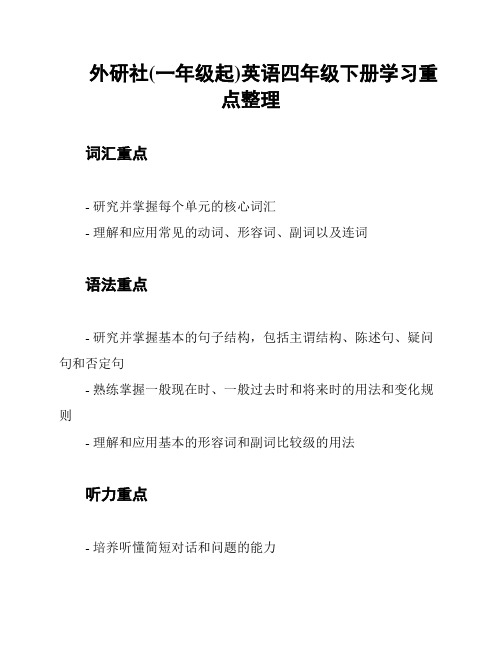
外研社(一年级起)英语四年级下册学习重
点整理
词汇重点
- 研究并掌握每个单元的核心词汇
- 理解和应用常见的动词、形容词、副词以及连词
语法重点
- 研究并掌握基本的句子结构,包括主谓结构、陈述句、疑问句和否定句
- 熟练掌握一般现在时、一般过去时和将来时的用法和变化规则
- 理解和应用基本的形容词和副词比较级的用法
听力重点
- 培养听懂简短对话和问题的能力
- 提高听懂日常生活中关于时间、地点、人物和活动的问题的能力
- 研究听懂简短故事并提取关键信息的能力
口语重点
- 练运用学过的词汇和句型进行简单的日常会话
- 学会表达自己的观点、感受和喜好
- 提高与他人交流和合作的能力
阅读重点
- 通过阅读短文和故事,培养理解和抽取关键信息的能力
- 学会根据文中提供的信息回答问题
- 提高阅读时的语音和语调的表达能力
写作重点
- 练书写短文和简单的句子,描述自己的家庭、朋友和学校生活
- 学会运用所学词汇和语法结构进行基本的写作对话和情景
以上是外研社(一年级起)英语四年级下册的学习重点整理。
通过重点的学习和实践,学生们将能够提高听说读写的能力,更好地运用英语进行交流和表达。
(完整版)外研社小学英语一起小学四年级下语法总结及练习题

(完整版)外研社⼩学英语⼀起⼩学四年级下语法总结及练习题外研社英语⼀起四年级上语法总结及练习题祈使句表达说话⼈对对⽅的叮嘱、劝告、请求或命令等,往往有表⽰请求、命令、希望、禁⽌、劝告等意思.句末⽤感叹号或句号,⽤降调朗读.肯定结构都以动词原形开头. 祈使句⼀般没有主语,实际上是省略了主语“You”.祈使句的肯定句式有三种形式,即1)Do型(以⾏为动词原形开头),例如:Sit down 坐下! Stand up 起⽴!2)Be型(以be开头),例如:Be quiet!安静!3)Let型(以let开头),例如:Let me help you.祈使句的否定结构是以“Don’t+动词原形”开头.例如:Don’t go there,please.请别去那⼉.Don’t be late.不要迟到⽤括号内所给动词的适当形式填空。
1. __________ (not, be) late.2. ____________ (dust) the dressing table.3. ____________ (not, speak) with your mouth full of food.4. ____________ (not, talk) and ____________ (read) a book.5. ____________ (not, drop) the nice vase, Sam.6. ____________ (look) out! A car is coming.7. ____________ (give) us ten years and just see what our country will be like.8. ____________ (not, let) the baby cry.9. ____________ (open) the window and ____________ (shut) the door.10. Let’s ____________ (sweep) the floor.根据要求改写句⼦1. Will you please read it again more slowly? (改为祈使句)__________ __________ again more slowly, please.2. Please sit next to Nancy. (改为否定句)__________ __________ next to Nancy.3. Come to my house tomorrow. (改为否定句)__________ come to my house tomorrow.4. Wear the glasses! (改为否定句)___________ wear the glasses!5. Don’t wash your hands! (改成肯定句)___________ your hands!⼀般过去时时间状语:1.yesterday,morning(afternoon,evening)等2.由“last+⼀时间名词”构成的短语:last night,last year(winter,month,week)等3.由“时间段+ago”构成的短语:a moment ago,a short time ago,an hour ago等4.其它:just now等Was,were的⼀般过去时构成:肯定句式:主语+be(was,were)+其它.否定句式:主语+be(was,were)+not+其它.⼀般疑问句:Be(was,were)+主语+其它?肯定回答: Yes, 主语+ be(was,were)否定回答:No, 主语+be(was,were)+not.含有实义动词(⾏为动词)的⼀般过去时的主结构:构成:肯定句:主语+动词的过去时+其它。
外研社小学英语一年级起点四年级下册 Module2 单词练习+语法练习

Module2 单词练习+语法练习
一、根据句子的中文含义填写单词
1.I can _______ an ______ to you.
我可以发送一封邮件给你。
2.It _______s one hundred and eight _______.
它花了108元。
3.This bag is _______.
这个书包是蓝色的。
4.These flowers are _______.
这些花是粉色的。
5.This pen is _______.
这只钢笔是便宜的。
6.This football is _______.
这个足球是贵的。
7.What ______?
什么颜色?
二、判断这些单词划横线部分的自然拼读是否一致,一致打✔,不一致打×
三、把下面的句子从陈述句变成一般疑问句,并且翻译一般疑问句。
举例:
She is nice.
一般疑问句:Is she nice?
中文:她友好吗?
1.It is cheap.
一般疑问句:
中文:
2.This pen is expensive.
一般疑问句:
中文:
3.This flower is beautiful.
一般疑问句:
中文:
4.The bag is blue.
一般疑问句:
中文:。
外研版小学四年级英语下学期知识点总结
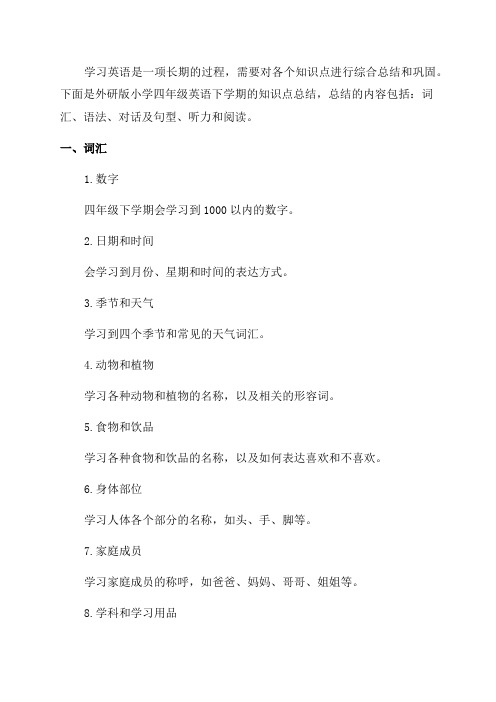
学习英语是一项长期的过程,需要对各个知识点进行综合总结和巩固。
下面是外研版小学四年级英语下学期的知识点总结,总结的内容包括:词汇、语法、对话及句型、听力和阅读。
一、词汇1.数字四年级下学期会学习到1000以内的数字。
2.日期和时间会学习到月份、星期和时间的表达方式。
3.季节和天气学习到四个季节和常见的天气词汇。
4.动物和植物学习各种动物和植物的名称,以及相关的形容词。
5.食物和饮品学习各种食物和饮品的名称,以及如何表达喜欢和不喜欢。
6.身体部位学习人体各个部分的名称,如头、手、脚等。
7.家庭成员学习家庭成员的称呼,如爸爸、妈妈、哥哥、姐姐等。
8.学科和学习用品学习各种学科和学习用品的名称。
二、语法1.数字的表达学习如何表达数字,包括基数词和序数词。
2.一般现在时学习一般现在时的基本用法,并学会构造肯定句、否定句和疑问句。
3.介词的使用学习几个常用的介词并能正确运用在句子中。
4.物主代词学习如何用物主代词表达物品的所有关系。
5.反意疑问句学习如何使用反意疑问句来加强陈述句的语气。
三、对话及句型1.问候和交流学习如何用英语进行问候和交流,如"Hello, how are you?"。
2.请求和询问学习如何用礼貌的方式请求和询问,如"Can I have a pen, please?"。
3.表达喜好和不喜好学习如何表达自己的喜好和不喜好,如"I like swimming, but Idon't like running"。
4.描述事物学习如何用英语描述事物的外表、颜色、大小等特点。
5.提供帮助和回答问题学习如何提供帮助和回答问题,如"Do you need any help?"。
四、听力1.听懂简单的对话通过听力练习,培养听懂简单对话的能力,如问候、介绍自己、询问个人信息等。
2.听懂简单的指示和指导词通过听力练习,培养听懂简单指示和指导词的能力,如Go straight、Turn left等。
(完整版)外研版(一年级起点)四年级英语下册第1-3模块知识点及习题

(完整版)外研版(⼀年级起点)四年级英语下册第1-3模块知识点及习题Module 1【关键知识点】“要别⼈做某事或不做某事”⽤祈使句,句中动词要⽤原形。
表⽰禁⽌的:Don’t…please!表⽰肯定的:Wear… please!祈使句:动词原形开头,省略主语(变否定直接在动词前⾯加Don’t)Eg:Open the door,变否定为Don’t open the door 【重要句型】Don’t sing here! 不要在这⼉唱歌。
Don’t write here! 不要在这⼉写字。
Don’t talk here! 不要在这⼉说话。
Wear the glasses! 戴上眼镜。
Wear the hat! 戴上帽⼦。
Stop! 停下来。
Don’t feed the ducks! 不要喂鸭⼦。
Don’t walk on the grass! 不要踩草地。
Don’t touch the machines! 不要碰这些机器。
Don’t write on the books! 不要在书上写字。
Silence! 安静。
Wash your hands! 洗⼿。
【重要词汇】1.factory 的复数是factories ⼯⼚2.children孩⼦们,单数是child3.these这些,单数是this4.those那些,单数是that5.crisp炸薯⽚,复数是crisps6.do的三⼈称单数是does 做7.wash的三⼈称单数是washes 洗8.put的三⼈称单数是puts 放9.potato的复数是potatoes练习:⼀、单项选择1.Don’t______ on the grass A. walks B.walk C.walking2.Please______the door A.open B.opens C.opening⼆、填上适当的词1.This machine____(make) crisps2.Don’t______(walk) on the grass3.You can have a bag of____(crisps) now4.What____(do) this factory do?5.These_____(machine)cut potatoes6.It_____(wash) the tomatoes7.Don’t______(touches) the machines8.This machine____(put)the crisps in the bags9.The baby is____(sleep) now10.They are____(potato)Module 2【关键知识点】重点学习⽤形容词来形容物品,主要句型是:This …is….It’s…【重要句型】This computer is beautiful. It’s purple. 这台电脑很漂亮。
(完整版)最新外研版小学四年级英语下册知识点归纳复习
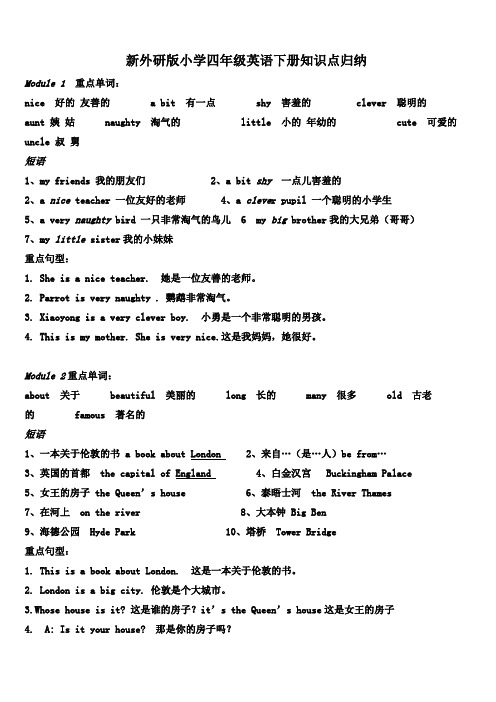
新外研版小学四年级英语下册知识点归纳Module 1 重点单词:nice 好的友善的 a bit 有一点 shy 害羞的clever 聪明的aunt 姨姑 naughty 淘气的 little 小的年幼的 cute 可爱的uncle 叔舅短语1、my friends 我的朋友们2、a bit shy 一点儿害羞的2、a nice teacher 一位友好的老师 4、a cleve r pupil 一个聪明的小学生5、a very naughty bird 一只非常淘气的鸟儿 6 my big brother我的大兄弟(哥哥)7、my little sister我的小妹妹重点句型:1. She is a nice teacher. 她是一位友善的老师。
2. Parrot is very naughty . 鹦鹉非常淘气。
3. Xiaoyong is a very clever boy. 小勇是一个非常聪明的男孩。
4. This is my mother. She is very nice.这是我妈妈,她很好。
Module 2重点单词:about 关于beautiful 美丽的long 长的many 很多old 古老的famous 著名的短语1、一本关于伦敦的书 a book about London2、来自…(是…人)be from…3、英国的首都 the capital of England4、白金汉宫 Buckingham Palace5、女王的房子 the Queen’s house6、泰晤士河 the River Thames7、在河上 on the river 8、大本钟 Big Ben9、海德公园 Hyde Park 10、塔桥 Tower Bridge重点句型:1. This is a book about London. 这是一本关于伦敦的书。
2. London is a big city. 伦敦是个大城市。
外研版小学英语一起四年级下册知识点汇总

外研版小学英语一起四年级下册知识点汇总1. 单词和词组- 本册单元 1 中的重要单词和词组有:apple、banana、watermelon、orange、grape、bread、milk、tea、hamburger、hot dog、I like 、me too、not bad.- 本册单元 2 中的重要单词和词组有:tomato、potato、carrot、cabbage、pear、strawberry、chicken、beef、fish、egg、noodle、rice、potato chips、salad、I don’t like、How about 、I’m sorry、one more time.- ...2. 语法- 本册单元1 中的语法重点是介词in、on、under 和量词some、a glass of.- 本册单元 2 中的语法重点是物主代词 my、your、his、her 和谓语动词有关的疑问句。
3. 句型- 本册单元 1 中的重点句型有:I like apples.、I like bananas.、I like watermelons.、Do you like grapes?、Yes, I do.、No, I don’t.- 本册单元 2 中的重点句型有:I like tomatoes.、I like carrots.、I like potatoes.、Do you like cabbage?、Yes, I do.、No, I don’t.4. 听力和口语- 本册单元 1 中的听力和口语部分主要包括日常食物的表达和对喜好的表达。
- 本册单元 2 中的听力和口语部分主要包括日常蔬菜的表达和对喜好的询问和回答。
5. 阅读和写作- 本册单元 1 中的阅读部分包括简单的对话和填空题,写作部分主要是书写单词和句子。
- 本册单元 2 中的阅读部分包括简单的短文和选择题,写作部分主要是书写句子和回答问题。
外研社一年级起点小学四年级英语下册知识点

Module 1 这机器出了什么故障machine英[mәˈʃi:n] / 美[mәˈʃin] n.机器What's the trouble with the machine?这机器出了什么故障?welcome英[ˈwelkәm] /美[ˈwɛlkәm] vt.欢迎Welcome to las Vegas.欢迎来到拉斯维加斯。
*crisp英[krɪsp] / 美[krɪsp] n.炸薯片A packet of crisps.一包炸薯片。
sir英[sɜ:(r)] / [sɚ] n.先生Good afternoon to you, sir.下午好,先生。
potato英[pәˈteɪtәʊ] /美[pәˈteɪtoʊ] n.马铃薯,土豆I want some meat and potatoes.我想要一些肉和土豆。
dangerous英[ˈdeɪndʒәrәs] /美[ˈdendʒәrәs] adj.危险的Don't run down the stairs. It's dangerous!不要跑下楼梯,太危险了!put英英[pʊt] / 美[pʊt]vt.放,安放,放置Who put my little cat there?是谁把我的小猫咪放那儿的?wait英[weɪt]/ 美[wet] vt.& vi.等;等待The spider must wait for prey to be ensnared on its web.蜘蛛必须等待猎物被它的蛛网困住。
each英[i:tʃ] /美[itʃ] pron.各自;每个Each cell of our bodies contains 46 chromosomes.我们人体的每个细胞都包含46个染色体。
Module 2 他们全天供应早餐,而且价钱公道cheap英[tʃi:p] / 美[tʃip] adj.便宜的They served breakfast all day and sold it cheap.他们全天供应早餐,而且价钱公道。
外研版小学英语(一起)四年级下册期末复习知识汇总
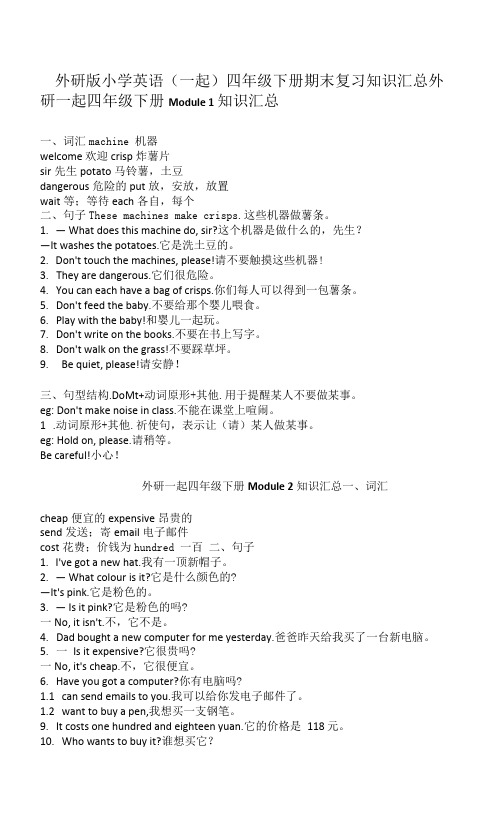
外研版小学英语(一起)四年级下册期末复习知识汇总外研一起四年级下册Module 1知识汇总一、词汇machine 机器welcome 欢迎crisp炸薯片sir先生potato马铃薯,土豆dangerous危险的put放,安放,放置wait等;等待each各自,每个二、句子These machines make crisps.这些机器做薯条。
1.— What does this machine do, sir?这个机器是做什么的,先生?—It washes the potatoes.它是洗土豆的。
2.Don't touch the machines, please!请不要触摸这些机器!3.They are dangerous.它们很危险。
4.You can each have a bag of crisps.你们每人可以得到一包薯条。
5.Don't feed the baby.不要给那个婴儿喂食。
6.Play with the baby!和婴儿一起玩。
7.Don't write on the books.不要在书上写字。
8.Don't walk on the grass!不要踩草坪。
9.Be quiet, please!请安静!三、句型结构.DoMt+动词原形+其他.用于提醒某人不要做某事。
eg: Don't make noise in class.不能在课堂上喧闹。
1.动词原形+其他.祈使句,表示让(请)某人做某事。
eg: Hold on, please.请稍等。
Be careful!小心!外研一起四年级下册Module 2知识汇总一、词汇cheap便宜的expensive昂贵的send发送;寄email电子邮件cost花费;价钱为hundred 一百二、句子1.I've got a new hat.我有一顶新帽子。
2.— What colour is it?它是什么颜色的?—It's pink.它是粉色的。
外研社小学英语(一年级起点)四年级下知识点整理

外研社小学英语(一年级起点)四年级下知识点整理(例句都是课本中原句)1.祈使句:表示请求、命令、建议等的句子。
祈使句不需要主语,谓语动词用原形,句子末尾一般用感叹号。
eg: (1) Don’t walk on the grass! (否定祈使句)make a newspaper! (肯定祈使句)(2)Let’s2.一般现在时:经常发生的动作或状态(常与always, usually, often,连用) sometimes, seldom, never, every day/week/year, on Sundays ...(1) be动词的一般现在时:(比较简单)I am, We/You/They are, He/She/It is,There is+单数名词或不可数名词, There are + 复数名词eg: It’shelpful.not beautiful, but it’s(2) 行为动词的一般现在时:(单数第三人称的变化是重点、易错点; 助动词用do, don’t, does, doesn’t)eg: (1)This machine cuts the potatoes.(2) Does he live in New York?(3) Fish live in the river and birds live in the tree. (***注意fish单数和复数写法一样,这里fish前面没有a,所以是复数形式,后面接谓语动词要用原形。
另外,Sheep和deer单复数也是一样的形式)3.一般过去时:表示过去发生的动作或状态(常与...ago, yesterday,the day before yesterday, last week/year/month, once upon a time, one day, the next day, in 2016...连用)(1)be动词的一般过去时:I/He/She/It was, We/You/They were, There was+单数名词或不可数名词, There were + 复数名词eg:Once upon a time, there was a boy. (讲故事常用说法)(2)行为动词的一般过去时:(助动词用did, didn’t)①一般动词变化:构成法:1. 动词原形+ed. 如:look--looked2.以e结尾的词+d. 如:live--lived3.以辅音字母+y结尾的词,改y为i, 再加ed.如:study--studied, cry--cried.4.以重读闭音节或r音节结尾,末尾只有一个辅音字母的词,双写这个辅音字母,再加ed. 如: clap--clapped, stop--stopped, prefer--preferred②不规则动词变化:如had, said, put, saw, got, ran, learnt(英式写法), bought, came, took, went等eg1: The animals had a concert last week.eg2: The next day, the boy ran to the village again.eg3: What did he play yesterday?eg4: When did you get up last Sunday? I got up at 8 o’clock.4.一般将来时:表示还没有发生但将要发生的事情或动作(常与tomorrow, the day after tomorrow, next year/month/week, soon, in the future, in ... minutes/hours/days...连用 )(1)Be going to+ 动词原形:多表示即将发生,最近打算、计划、安排好要做的事情,主观性较强 (区分人称,be动词变化am, is, are)eg: She’s going to visit Australia.(2)Will+动词原形:多表示即将发生的动作或状态,不受主观因素影响的单纯的将来,客观性较强 (不区分人称,都用will)(***目前小学阶段对这两种形式区分并不明显,可以互换使用)eg: We will go to the zoo on Sunday.5.现在进行时:表示正在进行或发生的动作(常与now, at present, at this moment连用)Be动词+动词的现在分词(***区分人称,注意动词的现在分词构成的特殊情况)动词的现在分词构成法:(1)一般规则:动词+ing, 如: work--working.(2) 以e结尾的动词去掉e加ing. 如: live--living, have--having.(3)以重读闭音节或r音节结尾,末尾只有一个辅音字母的词,双写这个辅音字母,再加ing. 如: swim--swimming, clap--clapping, refer--referring.(4) 以ie结尾的重读开音节的词,改ie为y, 再加ing. 如: die--dying.eg: (1) What’s happening now?(2) Daming is making a card for his father.(3)We are having a party.6.购物相关话题:(1)I want to buy a pen.(2)It’s expensive/cheap.(3)It costs one hundred and eighteen yuan.(4)Who wants to buy it?7.音乐演奏相关话题:(***演奏乐器前要加定冠词the )(1)I played the piano yesterday.(2)You’re playing the violin for your father.(3)My mum and dad played in the concert.(4)In the end, everyone clapped.(***注意玩球类运动不能加定冠词the, eg:I played football yesterday. ) 8.时间相关话题:(1)What’s the time now?(2)What time is it now?(3)It’s 2 o’clock.(4)Is it breakfast/lunch/dinner time now?(5)The Chinese cartoon Shaolin Kids is on TV at 8 o’clock.9.方向相关话题:(1)Where is the library?(2)It’s in the north/south/west/east of China.(3)I went to the north/south/west/east.(4)Beijing is the capital of China.10.原因相关话题:(1)Why do fish live in the river?(2)Because cats can’t live in the water.。
外研社小学英语四年级下册知识点总结复习资料

结外研版四年级英语下册总Module1--10 短语Module 1 短语1、my friend s 我的朋友们Will it...?2、a bit shy 一点儿害羞的→Yes, it will. / No, it won ’t.3、a nice teacher 一位友好的老师4、a cleve r pupil 一个聪明的小学生1、Monday 星期一Tuesday 星期二5、a very naughty bird 一只非常淘气的鸟儿Wednesday星期三Thursday 星期四6、my big brother我的大兄弟(哥哥)Friday 星期五Saturday 星期六7、my little sister我的小妹妹Sunday 星期日8. cool 酷的2、on Saturday 在星期六9. cute 可爱的3、have a picnic 举行、进行野餐4、take your kite / ball 带上你的风筝/球Module 2 短语5、The Weather Tomorrow 明天的天气(情况)1、一本关于伦敦的书a book about London 9、be windy 刮风的2、来自⋯(是⋯人)be from⋯10、be hot 炎热的3、英国的首都the capital of England 11、be cold 寒冷的4、白金汉宫Buckingham Palace 12、be sunny 晴朗的5、皇后(女王)的房子the Queen’s house 13、rain 下雨6、泰晤士河the River Thames 14、snow 下雪7、在河上on the river8、大本钟B ig Ben9、哈德公园Hyde Park Module 5 短语:10、塔桥T ower Bridge1、过去式:发生在过去的事情用过去式Module 3 短语:常和then(那时)或yesterday(昨天)一起用will + 动词(原形)表示“将来做...”2、be 动词过去式:①was ( is/am的过去式)1、do everything 做所有事→我(I) 、他(he、she、it )、一人+ was2、talk说w alk 走路3、do the housework 做家务②were ( are 的过去式)4、help children learn帮助孩子们学习→你( 们)(You) 他们(they )我们(we)+ were5、do our homework 做我们的作业6、next week 下周③否定式:wasn't weren't7、a holiday 一个假期8、go swimming 去游泳3、反义词9、play with my friends 和我的朋友玩乾洲教育在then(那时)——now(现在)线old(老的)——young(年轻的)10、go to the park 去公园long(长的)——short(短的)11、do my homework 做我的作业b ig(大的)——small(小的)12、visit my grandma 拜访我的奶奶good(好的)——bad(差的)13、help my mother 帮助我妈妈(做家务)tall(高的)——short(矮的)14、read my books 看我的书f at(胖的)——thin(瘦的)clean(干净的)——dirty(脏的)Module 4 短语:4、that little girl 那个小女孩Will you...? 5、so short如此矮→Yes, I will. / No, I won ’t. 6、so cute如此可爱2. go there (过去式:went) 去那儿Module 6 短语: 3. see some bird (过去式:saw) 看见一些小鸟1、重点句型: 4. sing beautiful (过去式:sang) 唱歌动听Were you...? 5. eat some food (过去式:ate) 吃一些食物→Yes, I was. / No, I wasn ’t. 6. drink some drinks(过去式:drank) 喝一些饮料Was it...? 7. dance (过去式:dance d) 跳舞→Yes, it was. / No, it wasn ’t. 8. play game (过去式:play ed) 玩游戏10. yesterday 昨天9. have a busy day (过去式:had)11.play in the sun 在阳光下玩耍度过愉快的一天12.at home 在家10. take some pictures 过(去式:took)拍一些照片13. Chinese Lesson 语文课14.a very small village 一个非常小的乡村Module 9 短语:1. 重点句型:Module 7 短语:Did you ... ?→Yes , I did / No, I didn ’t.动词的过去式规则动词:+ ed / d Did he...?不规则:没有规律,要背诵→Yes, he did / No, he didn ’t.2. live in Washington DC 住在华盛顿( live d )1. help Mum (过去式:help ed) 帮助妈妈 3. travel by plane 做飞机旅游( travel ed)2. phone grandma 过(去式:phone d )给奶奶打电话 4. visit New York 参观纽约(visit ed)3. wash clothes (过去式:wash ed ) 洗衣服 5. go to a pop concert去参加流行音乐会(went)4. cook fish (过去式:cook ed ) 做鱼 6. go to a football game 去看足球赛(went)5. cook noodles 煮面6.listen to music (过去式:listen ed ) 听音乐Module 10 短语:7.walk in the park (过去式:walk ed )在公园里散步1.What happened to....?...怎.. 么了?8.talk with some friends (过去式:talk ed ) 2.go for a bike ride 去骑自行车(过去式:went)和一些朋友聊天3.And then....?那后来呢?9. play on the computer (过去式:play ed ) 4.be hungry饿了玩电脑5.be thirsty渴了10. watch TV (过去式:watch ed ) 看电视 6.buy a watermelon买西瓜(过去式:bought)11.What about....?....怎么样?7.on the bike在自行车8.fall off his bike (过去式:fell)Module 8 短语:从自行车上摔下来9.bump my head碰了我的头(过去式:bumped ) 动词过去式(不规则)10.lots of 许多原形过去式11.chocolate 巧克力sing(唱歌)——sang 12.have got /h ave a stomach ache肚子/胃疼have(度过)——had 13.have a cold感冒(过去式:had)go (去)——went 14.have a headache头疼see (看见)——saw 15.have a fever发烧eat (吃)——ate 16.have a horrible cold 重感冒drink (喝)——drank 17.feel cold 感觉冷(过去式:felt ) take (拍摄)——took 18.feel hot 感觉热make (制作)——made1. have a picnic (过去式:had) 进行野餐。
(完整)外研版小学英语知识点归纳,推荐文档.doc

小学英语词汇专项一、词类1、名词(1)不可数名词都默认为单数,用“is”(2)可数名词复数变化规则:2、动词3 、形容词:主要修饰名词或代词,“......的”。
4 、副词:主要修饰动词或形容词,“.....地”,变副词一般 +ly,如 loudly 、 happily 、 well ( good)5、代词( 1)人称代词和物主代词:动词前用主格,动词后用宾格。
( 2)指示代词:指近处 this (这个) -these(这些) ;指远处 that (那个) -those (那些)6、冠词: a、 an、 thean:用于元音音素(一般a、 e、 i、 o、 u)前。
the :表示某个或某些特定的人或东西。
7、数词基数词:表示数量,如one ,two , three , four , five ,six, seven, eight, nine ,ten .eleven, twelve , thirteen , fourteen , fifteen , sixteen, seventeen, eighteen,nineteen . twenty ,thirty ,forty ,fifty,sixty,seventy,eighty,ninety.a hundred,a thousand,a million,a billion,one hundred and one.序数词:表示顺序,如 first (1st) ,second (2nd) ,third (3rd) ,fourth (4th) ,fifth (5th) ,sixth (6th),seventh (7th) ,eighth (8th),ninth (9th),tenth (10th)....二、重点考点1.+原形can、 let ’ s、 do( do、 does、 don’ t 、 doesn’ t、 did\didn ’ t )、 please、 should 、 will 、 towant to + 原型,would like to +原,forget to + 原,it’ s time to + 原。
外研社小学英语一年级起点四年级下册 知识点汇总
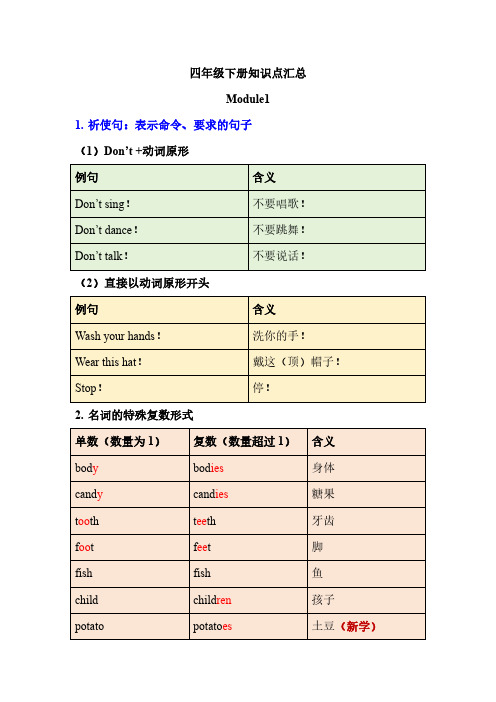
四年级下册知识点汇总Module11.祈使句:表示命令、要求的句子(1)Don’t+动词原形(2)直接以动词原形开头2.名词的特殊复数形式3.this和these的区别Module21.重点句型1—Is It....?—肯定回答:Yes,it is.否定回答:No,it isn’t.(isn’t=is not)举例:(1)—Is it expensive?它贵吗?—No,it isn’t.不,它不贵。
(2)—Is it big?它大吗?—Yes,it is.是的,它大。
(3)—Is it a pen?它是一只钢笔吗?—Yes,it is.是的,它是。
2.重点句型2—What colour is it?它是什么颜色?—It’s pink/blue/yellow/其他颜色.它是粉色/蓝色/黄色/其他颜色。
3.重点句型3It/某一件物品costs+数字+yuan.它/某一件物品花了多少元。
举例:It costs one hundred and eight yuan.它花了108元。
It costs30yuan.它花了30元。
This pen costs nineteen yuan.这只钢笔花了19元。
This pen costs one yuan.这只钢笔花了1元。
This bag costs one hundred and thirty yuan.这个书包花了130元。
Module3动词过去式相关的语法1.肯定句:动词过去式Chinese people invented paper.中国人发明了纸。
We went to the Great Wall.我们去了长城。
Ma Liang helped people.马良帮助了人们。
观察上面肯定句,invented、went、helped是动词过去式练习:把括号内的动词以正确的形式填写在横线上①She__________(come up)at school last week.②Sam______(learn)Chinese yesterday.③Lingling______(look after)her grandma last Sunday.④“Help,help!”,this boy_____(shout)yesterday.⑤“You naughty pig.”,this girl______(laugh)yesterday.2.否定句(1)否定句:didn’t+动词原形Chinese people didn’t invent bikes.中国人没有发明自行车。
- 1、下载文档前请自行甄别文档内容的完整性,平台不提供额外的编辑、内容补充、找答案等附加服务。
- 2、"仅部分预览"的文档,不可在线预览部分如存在完整性等问题,可反馈申请退款(可完整预览的文档不适用该条件!)。
- 3、如文档侵犯您的权益,请联系客服反馈,我们会尽快为您处理(人工客服工作时间:9:00-18:30)。
外研社英语一起四年级上语法总结及练习题
祈使句
表达说话人对对方的叮嘱、劝告、请求或命令等,往往有表示请求、命令、希望、禁止、劝告等意思.
祈使句一般没有主语,实际上是省略了主语“You”.句末用感叹号或句号,用降调朗读.肯定结构都以动词原形开头.
祈使句的肯定句式有三种形式,即
1)Do型(以行为动词原形开头),例如:Sit down 坐下! Stand up 起立!
2)Be型(以be开头),例如:Be quiet!安静!
3)Let型(以let开头),例如:Let me help you.
祈使句的否定结构是以“Don’t+动词原形”开头.例如:
Don’t go there,please.请别去那儿.
Don’t be late.不要迟到
用括号内所给动词的适当形式填空。
1. __________ (not, be) late.
2. ____________ (dust) the dressing table.
3. ____________ (not, speak) with your mouth full of food.
4. ____________ (not, talk) and ____________ (read) a book.
5. ____________ (not, drop) the nice vase, Sam.
6. ____________ (look) out! A car is coming.
7. ____________ (give) us ten years and just see what our country will be like.
8. ____________ (not, let) the baby cry.
9. ____________ (open) the window and ____________ (shut) the door.
10. Let’s ____________ (sweep) the floor.
根据要求改写句子
1. Will you please read it again more slowly? (改为祈使句)
__________ __________ again more slowly, please.
2. Please sit next to Nancy. (改为否定句)
__________ __________ next to Nancy.
3. Come to my house tomorrow. (改为否定句)
__________ come to my house tomorrow.
4. Wear the glasses! (改为否定句)
___________ wear the glasses!
5. Don’t wash your hands! (改成肯定句)
___________ your hands!
一般过去时
时间状语:
1.yesterday,morning(afternoon,evening)等
2.由“last+一时间名词”构成的短语:last night,last year(winter,month,week)等
3.由“时间段+ago”构成的短语:a moment ago,a short time ago,an hour ago等
4.其它:just now等
Was,were的一般过去时构成:
肯定句式:主语+be(was,were)+其它.
否定句式:主语+be(was,were)+not+其它.
一般疑问句:Be(was,were)+主语+其它?
肯定回答: Yes, 主语+ be(was,were)
否定回答:No, 主语+be(was,were)+not.
含有实义动词(行为动词)的一般过去时的主结构:
构成:
肯定句:主语+动词的过去时+其它。
否定句:主语+did+not+动词原形+其它。
did not缩写为didn’t
一般疑问句:Did+主语+动词原形+其它?
特殊疑问句:特殊疑问词+did+主语+动词原形+其它?
动词的适当形式填空
1. I________up at half past six this morning.(get)
2. My mother____________a lot of fruit yesterday afternoon.(buy)
3. They_________________a meeting yesterday.(not have)
4. The twins_________thirteen two years ago.(be)
5. I_________(have)an exciting party last weekend.
6. They all_________(go)to the mountains yesterday morning.
7. She_________ (not visit)her aunt last weekend.She________(stay)at home.
8. He __________(work) in that bank four years ago.
9. I __________(see) him yesterday.
10. The boy __________(have) a bad cold yesterday.
11. He __________(tell) a story to his daughter yesterday.
12. I __________(buy) a coat just now..
用括号里动词的适当形式填空
Last year Mr. Smith ___________ (go ) to China and Japan. He ___________ (have) a wonderful time. He ___________ (do) a lot of different things and ___________ (talk) to a great number of different people. He ___________ (eat) Chinese and Japanese food and ___________ (visit) a lot of interesting places. When he ___________ (go) back to England, he ___________ (be) very tired.
现在进行时
定义:表示现在或现阶段正在进行或发生的动作或存在的状态。
构成:由be(am/is/are)+动词-ing形式构成
常用的时间状语:“now”“look”“listen”“at the (this) moment”.
I am doing my homework now.
Look! My mother is running!!!
Listen! They are reading.
At the (this) moment, he is only weeping.
1. A: What is she_____________(do)?
B: She_______________(cook)dinner in the kitchen now.
2. Listen! Who _________________(sing)?
3. A: What___________ they ____________(do)?
B: They__________________(run)on the grass now.
4. Are they_____________(fly)kites? Yes, they are.
5. A: ___________the girls____________(catch)the butterflies?
B: No, they aren't. They____________ (pick)up leaves.
6. Bob _______________(swim)in the pool now.
7. They are_______________(make) a snowman.
8. The boys _________________(take) pictures in the garden now.
9. It's 12:00,the students ______________(have) lunch in the canteen now.
10. My father_______________(wash) his car outside now.
11. A: ______________ your brothers ______________(play) computer games now? B: Yes, they are.
12. I like_____________(dive) and________________(swim).
13. Look! The kangaroo_______________(jump), and the panda_________________ (sleep).。
